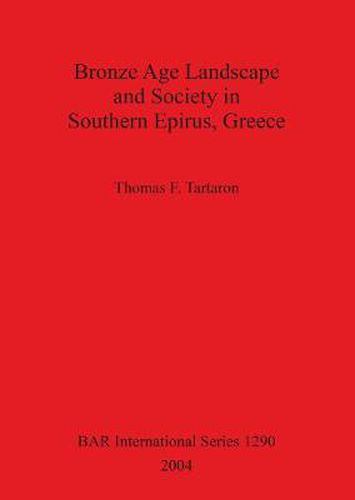Readings Newsletter
Become a Readings Member to make your shopping experience even easier.
Sign in or sign up for free!
You’re not far away from qualifying for FREE standard shipping within Australia
You’ve qualified for FREE standard shipping within Australia
The cart is loading…






This title is printed to order. This book may have been self-published. If so, we cannot guarantee the quality of the content. In the main most books will have gone through the editing process however some may not. We therefore suggest that you be aware of this before ordering this book. If in doubt check either the author or publisher’s details as we are unable to accept any returns unless they are faulty. Please contact us if you have any questions.
In this work the author focuses on the social and other non-material dimensions of life that are increasingly integral to landscape archaeology. Although the geographical focus of the study is southern Epirus, and in particular the lower valley of the Acheron River, the author also attempts a general, though not exhaustive, synthesis of the Bronze Age evidence from all of Greek Epirus. The Epirote Bronze Age remains poorly known and there has been no new synthesis for some time. Until recently, most of the scholarly work has been in Greek, much of it rather inaccessible, and this may have discouraged the wide dissemination of information. More importantly for the present case, however, a fresh assessment of evidence from the whole of Epirus (and to a lesser extent, surrounding regions) was essential to place events and longer-term processes in the lower Acheron valley in proper context. The landscapes of Epirus are highly diverse, and the lower Acheron valley, as lowland, coastal, and Mediterranean in climate, presented a singular set of circumstances to Bronze Age inhabitants. The important contrasts detected across Epirus throw into relief the divergent trajectory of the lower Acheron valley, and suggest certain explanations for it. It is hoped that this work will give the reader a sense of the Bronze Age landscapes of lowland southern Epirus, and a feeling for what it might have been like to inhabit them.
$9.00 standard shipping within Australia
FREE standard shipping within Australia for orders over $100.00
Express & International shipping calculated at checkout
This title is printed to order. This book may have been self-published. If so, we cannot guarantee the quality of the content. In the main most books will have gone through the editing process however some may not. We therefore suggest that you be aware of this before ordering this book. If in doubt check either the author or publisher’s details as we are unable to accept any returns unless they are faulty. Please contact us if you have any questions.
In this work the author focuses on the social and other non-material dimensions of life that are increasingly integral to landscape archaeology. Although the geographical focus of the study is southern Epirus, and in particular the lower valley of the Acheron River, the author also attempts a general, though not exhaustive, synthesis of the Bronze Age evidence from all of Greek Epirus. The Epirote Bronze Age remains poorly known and there has been no new synthesis for some time. Until recently, most of the scholarly work has been in Greek, much of it rather inaccessible, and this may have discouraged the wide dissemination of information. More importantly for the present case, however, a fresh assessment of evidence from the whole of Epirus (and to a lesser extent, surrounding regions) was essential to place events and longer-term processes in the lower Acheron valley in proper context. The landscapes of Epirus are highly diverse, and the lower Acheron valley, as lowland, coastal, and Mediterranean in climate, presented a singular set of circumstances to Bronze Age inhabitants. The important contrasts detected across Epirus throw into relief the divergent trajectory of the lower Acheron valley, and suggest certain explanations for it. It is hoped that this work will give the reader a sense of the Bronze Age landscapes of lowland southern Epirus, and a feeling for what it might have been like to inhabit them.